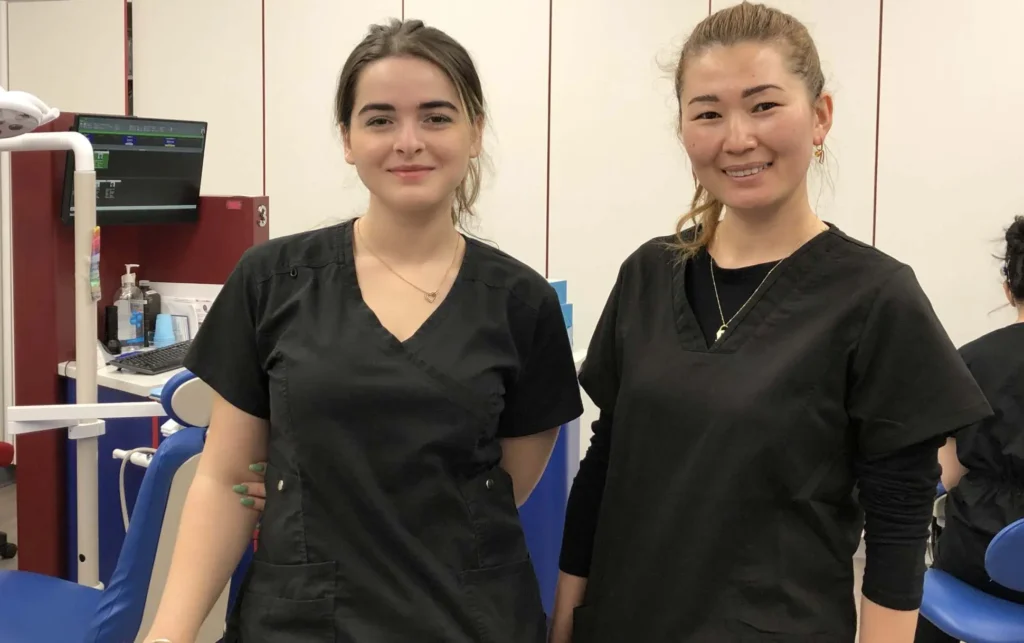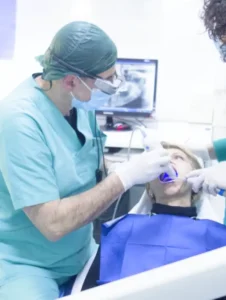Written by: Izabela Wysoczanski, Dental Upper Management
Date: January 24, 2022
Being a dental office manager is hard work: you’re usually the person responsible for solving nearly every problem that happens throughout the day.
For that reason, dental practice owners take their time when selecting the right office manager. They want to be sure that the person they hire will be able to take on the many responsibilities required of a manager of a busy practice.
If you’ve landed an interview – congratulations! You’ve achieved the first step of the hiring process. The practice thinks that your experience and qualifications are the right fit for what they need in a manager. The interview process, therefore, is to get to know you as a person, and understand your personality and whether you’d fit well with your team. For that reason, it’s important to be yourself! Forming a real connection with the hiring team will go a long way in helping you stand out as an amazing candidate for the dental office manager job.
This guide will help you ace any dental office manager experience, with interview tips and some common questions you’re likely to encounter.
Dental Office Manager Interview Tips
Below are a few tips that are applicable to any job, but are especially true for a job requiring the organizational skills and heightened responsibility of an office manager.
Research the practice before the interview
As noted by the Department of Labor, doing research on the employer ahead of time shows that you are serious about the job and not making assumptions based on prior knowledge. Even if you’ve worked as a dental office manager before, familiarizing yourself with this office will demonstrate your commitment to the job process and your ability to plan ahead, which is an important part of the role.
Prepare your own responses in advance
Even though you don’t know exactly what the interviewers will ask, you can still prepare some answers to likely questions, and gather your thoughts about your strengths, weaknesses, and any pertinent information about your work history and understanding of dental practices, billing, HIPAA policies, etc.
Preparing a personal mission statement can help you identify your goals and your ideas about your work and career. Writing this down ahead of time can help crystallize your thoughts so they come more easily during the interview!
Dress like you already have the job
By dressing as a responsible, professional example of an office manager, you’re giving the hiring team a positive glimpse into the kind of employer you could be for them.
Dressing in business or business casual sends a positive message about your professionalism and responsibility. Opt for cleanly pressed slacks or a skirt, blouse or button-up, and a sweater or blazer. Skip the sneakers and go for dressier shoes. Hide any tattoos with long sleeves, and keep your hair neatly pulled back and not in your face.
By dressing professionally, you’re showing you take the job seriously, you respect the hiring team, and you are capable of working as a reliable, responsible office manager.
Dental Office Manager Interview Questions & How to Answer
1. What is your office manager experience, specifically in the dental or medical field?
Your resume will give the hiring team a basic understanding of your experience, but this is an opportunity to brush them up and add any details about your work experience, including specialized training or credentials.
Example answer: I’ve worked as an office manager for 5 years, the last 2 in a dental office. It was a small office, so I handled most of the dental billing and coding myself, and ordered all supplies. I have a great deal of experience managing a team, communicating with insurance agencies, and more.”
2. What are your computer skills in a dental setting?
Office managers often have to assist in scheduling, billing, and ordering supplies, so computer literacy is key.
Example answer: “I’m experienced with dental billing, especially with Medicaid and Medicare. I have used a variety of scheduling and HW software and am quick to learn new systems. We used Microsoft Excel for most organizational spreadsheets, so I am fluent in that program.”
3. What is your familiarity with HIPAA?
If it’s been a while since you’ve looked up the regulations for HIPAA, brush up before the interview so they’re fresh in your mind.
Example answer: “Having worked in a dental office as an assistant manager for 3 years, I am very familiar with HIPAA procedures and patient privacy. I am always conscious of regulations when disclosing patient information, handling billing and other communications.”
4. What drew you to a career in dental office management?
Be honest, be yourself, and share your story! If you have a specific story about what made you want to become a dental office manager, share it here: hiring managers want to get to know you as a person, and this is a great way to share more about yourself.
Example answer: “My mom was an office manager at a small medical practice, and her colleagues were like family growing up. I liked the fast-paced setting, mixed with the friendly team and interacting with the patients. When I was graduating high school and deciding what to do next, it was a natural choice. I am just like my mom in that I love talking, but I am also a multitasker. I love being able to connect with people all day while getting things done!”
5. What are the key ingredients of a great office manager, and which do you possess?
Questions like these allow you to shed insight on your experience working in the role, as well as highlight the parts of it you do best.
Example answer: “There are a lot of skills necessary to be a great office manager, but I think the most important one is being quick on your feet. Things change fast in a medical office, and crises show up sometimes: you just have to be able to adapt to what’s happening, make quick calls at the moment, and keep moving. I learned that from my mom; I am pretty adaptable and can react to complicated, stressful situations quickly. Communication, patience, amazing organization are all important, too!”
6. What are your weaknesses as an office manager?
This is the classic interview question that keeps people up at night: you don’t want to put yourself down, but you also want to sound like a real human with flaws. To strike the right balance, it’s best to talk about a weakness that you’ve worked to overcome, and how you’ve done so. This way, you can highlight your ability to overcome obstacles and acknowledge your real human limitations.
Example answer: “I sometimes have a hard time being firm with patients. People get angry, it happens – it’s often about bills or an extra cost they didn’t expect, and my instinct is to make people happy. But when I first started working, I learned that you also have to stand up for the office and find a solution, which means being firm. I’ve had to teach myself not to roll over to make patients happy, and actually, work to find a solution that works for them and the office. I’ve learned that with the right attitude, patience and empathy, people will generally calm down and you can work together to find a solution. But I still have to remind myself sometimes to stand up for myself!”
7. What’s an example of a difficulty you’ve had at work?
Use this opportunity to share a real story of a difficult situation, but be careful not to badmouth your former colleagues or superiors. Instead, frame the story as something you’ve overcome: hiring managers ask this question to find out more about your problem-solving skills.
Example answer: “In my last role as a dental office manager, we had a chronically late employee. She had a lot on her plate, she was a single mom and also taking care of her mom, so I know she was stressed, but it was starting to impact the rest of the team and people were complaining. I had talked with her several times and nothing had changed, and I wasn’t sure what to do. Finally, I asked her if she wanted to go get a coffee, and we took our lunch break together and just chatted. That put us on a good, friendly footing, and made it easier to talk through the issues. We ended up shifting the schedule so she could come in a little later and stay later to accommodate the shift. It really taught me how taking the time to connect can make things easier.”
8. Why are you leaving your last job?
As noted in Career Contessa, raw honestly is not always exactly helpful in answering this question. No matter why you’re looking for a new job, badmouthing former employers is always a bad look. Be as honest as you can be, while focusing on the positive opportunities of a new position.
Example answer: “My last practice was a very large dental office with 10 different doctors and many assistants. It was hard to feel connected to so many people. I’m looking for an office where I can really build a community of colleagues and get to know everyone individually, which is what drew me to your practice.”
9. Why would you like to work here?
This question is a great way to connect to the hiring team and start to build a personal relationship. They’re surely proud of their team, and speaking highly of them and highlighting your shared values if a great way to connect. Use personal details from your research about the office, rather than general things like “you are nice people.”
Example answer: “I’m really looking for a close-knit team of people who support each other and take the time to build the team morale. I saw that you do a Relay for Life every year – we did that at my last job, and it was one of the highlights of the year. As a manager I’m always looking for opportunities to boost team morale and find ways to connect, and I’m drawn to the way your team is already doing that so well!”
10. Why would you be a good fit for our team?
A question of this sort is generally asked at the end of the interview: the hiring team is giving you the opportunity to “make the case” for you as a member of the team. Having an “elevator pitch” prepared is a great thing to do ahead of time so you can really be prepared to state your case. Don’t boast or brag, and don’t put anyone else down, but you should come across as confident and capable.
Example answer: “I believe I’d be an excellent dental office manager for this team because of my experience and commitment to my team. I think one of the most important aspects of good management is making everyone on your team feel appreciated, and I’ve worked hard to do that for my coworkers every day. I can tell this practice is really devoted to patient care and the moral of the team, and I think I could really help support that.

